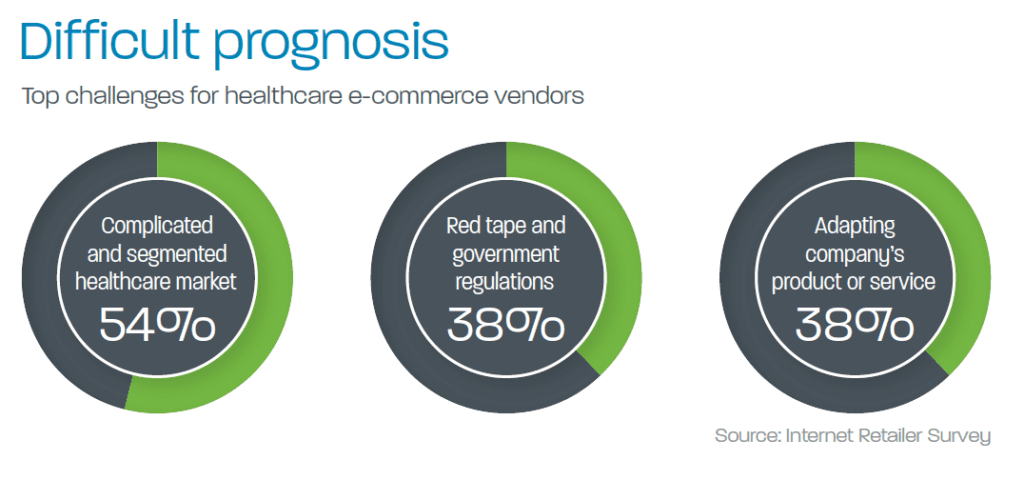More e-commerce vendors and other providers are targeting digital healthcare as a significant new business strategy.
A recent survey by Internet Health Management and Internet Retailer that included a detailed response from 29 e-commerce vendors from multiple technology categories that included content delivery, e-commerce platform, payment systems, personalization and others finds that 54% of e-commerce vendors target hospitals and health systems as their primary new business prospect in healthcare, followed by insurance companies and physician groups at 21%, respectively, the Internet Retailer survey found.
54% of respondents also said that learning the complicated and segmented healthcare market was their top challenge. That outpaces the 38% who cited the difficulty in dealing with red tape and government regulations. 38% also named adapting their company’s e-commerce product or service for healthcare as a challenge.
Many e-commerce vendors have the established software and service products healthcare organizations need to offer patients and consumers more self-service web tools to manage their health, wellness and health business online, says Ashraf Shehata, a partner in the Global Healthcare Center of Excellence at KPMG US. But selling e-commerce technology and services in healthcare is far different than selling to retailers and financial services companies, he says. For instance, many healthcare chief information executives are spending money and staff time maintaining older or poorly integrated legacy systems. “They are still focused on maintaining what’s inside the four walls,” Shehata says.
Many healthcare organizations also are used to information technology project implementations and timelines based on a five- to seven-year circle and may not be used to fast track web technology projects that often use a two- to four-year planning and implementation cycle. “Consumers want and expect more web access across healthcare but healthcare is way behind compared to other industries and there is resistance to change,” Shehata says.
One way e-commerce vendors can expand their base in healthcare is to leverage their products in integrated and flexible ways that can help healthcare organizations and hospitals automate multiple tasks at once. For instance, customer relationship platform provider Salesforce is betting a bevy of new tools for its Health Cloud platform, and an expanding list of application development partners, will equip healthcare providers with the technology needed to put the patient relationship at the center of care delivery.
A newcomer to digital healthcare technology—Salesforce rolled out Health Cloud in 2016—Salesforce made the enhancements in response to the many challenges facing providers in the current healthcare landscape, such as identifying their most at-risk patients and engaging with them in more personalized ways, the company says.
Pricing for Salesforce Health Cloud starts at $150 per user, per month, the company says. Among the early customers using Health Cloud is Easter Seals Bay Area in San Francisco. The enhancements are intended to help providers improve practice management and develop better one-to-one patient relationships that pave the way to a higher quality of care. “In healthcare, the potential of CRM remains untapped,” says Joshua Newman, chief medical officer at Salesforce. “While individuals have always cared about patients, the organization and its systems have neglected the patient experience. This has bred disconnected care and disjointed relationships, and made effective collaboration difficult.” By adding customer relationship management tools for Health Cloud, physicians can understand the person behind the patient, while achieving meaningful clinical and administrative outcomes, Newman says.

With insurance carriers moving toward outcome-based reimbursements, the need for providers to view risk across their patient populations to proactively deliver preventive care before a patient lands in the emergency room or hospital is growing exponentially, Newman says. Health Cloud’s risk stratification app uses analytics to calculate risk scores for each patient based on the Centers for Medicare and Medicaid Services hierarchical condition category mode, the company says. “Providers can view risk across their patient population in customizable dashboards to provide targeted preventative care to the patients who need it the most, while gaining new insights into the populations they serve,” Newman says.
The ability to gauge patient risk will make it easier for providers to segment patient populations and target them for outreach. A provider using Health Cloud’s segmentation feature, for example, can identify patients 65 or older with diabetes, or patients who have been discharged from knee surgery in the last 30 days, and send follow-up appointment reminders, surveys or educational materials to those patient populations. While improving the quality of care and patient relationships are priorities for providers, medical practices, like any business, still need to attract new customers in order to grow. Health Cloud’s lead-to-patient app can be integrated with other Salesforce applications, as well as electronic health records, data warehouse and patient registration systems, or call centers.
Once patient data is entered in Health Cloud, providers can use it to create unique care plans and map patient relationships, Newman says. “Hospitals are learning to treat their patients as customers and healthcare is a referral business,” Newman says. “That’s how CRM technology can be leveraged for additional uses.” Despite the healthcare market’s complexities, more e-commerce technology and services providers will look to the space as a potential big new market. For example, 48% of respondents to the Internet Health Management/ Internet Retailer survey said they view healthcare as a market comparable to retail for their web or e-commerce product or service.